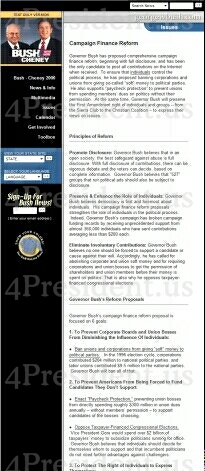|

George W. Bush 2000 On The Issues
Campaign
Finance Reform
Governor Bush has proposed
comprehensive campaign finance reform, beginning with full disclosure, and
has been the only candidate to post all contributions on the Internet when
received. To ensure that individuals control the political
process, he has proposed banning corporations and unions from giving
so-called “soft” money to political parties. He also supports
“paycheck protection” to prevent unions from spending members’ dues
on politics without their permission. At the same time, Governor
Bush will preserve the First Amendment right of individuals and groups –
from the Sierra Club to the Christian Coalition – to express their views
on issues.
Principles of Reform
Promote Disclosure: Governor Bush believes that in an open society,
the best safeguard against abuse is full disclosure. With full disclosure
of contributions, there can be vigorous debate and the voters can decide,
based on complete information. Governor Bush believes that “527”
groups that run political ads should also be subject to disclosure.
Preserve & Enhance the Role of Individuals: Governor Bush
believes democracy is first and foremost about individuals. His
campaign finance reform proposals strengthen the role of individuals in
the political process. Indeed, Governor Bush’s campaign has broken
campaign funding records by receiving unprecedented support from almost
360,000 individuals who have sent contributions averaging less than $200
each.
Eliminate Involuntary Contributions: Governor Bush believes no one
should be forced to support a candidate or cause against their will.
Accordingly, he has called for abolishing corporate and union soft money
and for requiring corporations and union bosses to get the permission of
shareholders and union members before their money is spent on politics.
That is also why he opposes taxpayer-financed congressional elections.
Governor Bush’s Reform Proposals
Governor Bush’s campaign finance reform proposal is focused on 6 goals:
1. To Prevent Corporate Boards and Union Bosses From Diminishing the
Influence Of Individuals:
- Ban unions and corporations from giving “soft” money to
political parties. In the 1996 election cycle, corporations
contributed $204 million to national political parties, and labor
unions contributed $9.5 million to the national parties. Governor
Bush will ban all of that.
2. To Prevent Americans From Being Forced to Fund Candidates They
Don’t Support:
- Enact “Paycheck Protection,” preventing union bosses from
directly spending roughly $300 million in union dues annually –
without members’ permission – to support candidates of the
bosses’ choosing.
- Oppose Taxpayer-Financed Congressional Elections. Vice
President Gore would spend over $2 billion of taxpayers’ money to
subsidize politicians running for office. Governor Bush believes
that individuals should decide for themselves whom to support and that
incumbent politicians do not need further advantages against
challengers.
3. To Protect The Right of Individuals to Express Themselves:
- Preserve the right of individuals and groups to engage in issue
advocacy. Vice President Gore would protect incumbents from
scrutiny by unconstitutionally restricting the rights of citizens to
express their views and concerns on issues.
- Raise the limit on individual contributions to candidates by
adjusting it for inflation.
4. To Ensure Full And Timely Disclosure Of Campaign Contributions:
- Require near real-time disclosure of contributions on the
Internet, as he alone among the presidential candidates is already
doing.
5. To End “Double Dipping” and Respect Donors’ Choices:
- Eliminate the “roll-over” loophole and prevent incumbents
from transferring excess funds from a prior federal campaign to a
subsequent campaign for a different federal office.
6. To Ensure That Lawmakers Serve The Public Interest:
- Prohibit federally registered lobbyists from contributing to
Members of Congress, while Congress is in session.
Position Proposals
Source: George W. Bush for President 2000 Web Site |
|